形容词 or 副词
- 格式:ppt
- 大小:25.50 KB
- 文档页数:7
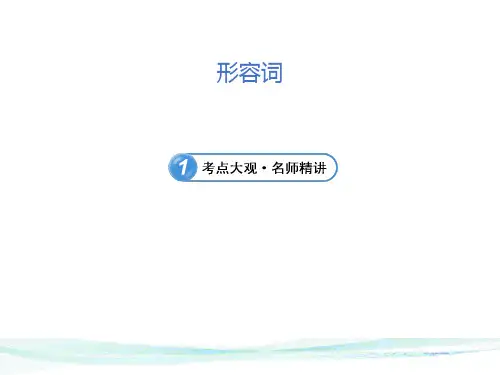
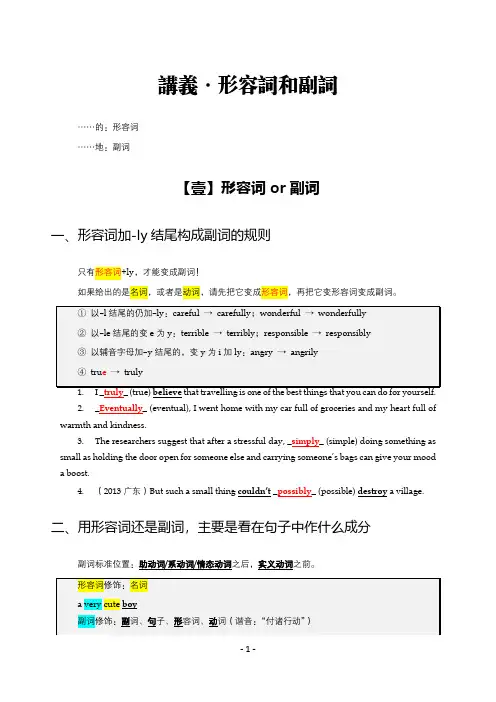
讲义·形容词和副词……的:形容词……地:副词【壹】形容词or副词一、形容词加-ly结尾构成副词的规则只有形容词+ly,才能变成副词!如果给出的是名词,或者是动词,请先把它变成形容词,再把它变形容词变成副词。
①以–l结尾的仍加–ly:careful →carefully;wonderful →wonderfully②以–le结尾的变e为y:terrible →terribly;responsible →responsibly③以辅音字母加–y结尾的,变y为i加ly:angry →angrily④tru e→truly1. I _truly_ (true) believe that travelling is one of the best things that you can do for yourself.2. _Eventually_ (eventual), I went home with my car full of groceries and my heart full of warmth and kindness.3. The researchers suggest that after a stressful day, _simply_ (simple) doing something as small as holding the door open for someone else and carrying someone’s bags can give your mooda boost.4. (2013广东)But such a small thing couldn’t _possibly_ (possible) destroy a village.二、用形容词还是副词,主要是看在句子中作什么成分副词标准位置:助动词/系动词/情态动词之后,实义动词之前。
形容词修饰:名词a very cute boy副词修饰:副词、句子、形容词、动词(谐音:“付诸行动”)very beautifulHe runs fast.He runs very fast.Honestly, ~~~~~5. In recent years, Internet voting has become _increasingly_ (increase) popular in China.6. These prices may seem expensive but in my opinion, it is a _truly_ (true) magical experience.7. Betty was having a _particularly_ (particular) hard time because her father had acted wrongly.8. In some cases, it is the term used for being _environmentally_ (environ ment) friendly.9. Not _surprisingly_ (surprise), it become an instant hit.10. _Strangely_ (strange) enough, he never fell.11. (2015广东)_Luckily_ (lucky), he also had a cow which produced milk every day.12. _Amusingly/Amused_ (amuse), the boy followed his parents out of the door.13. (2014陕西)Men and Women must be treated_equally_ (equal) in education and employment.14. (2014新课标二)A woman on the bus shouted, “Oh, dear! It’s mine.” She pushed her way to the driver and took the suitcase _thankfully_ (thank).15. Their grown children visit them _occasionally_ (occasion).16. (2014新课标一)The river was so polluted that it _actually_ (actual) caught fire and burned.17. (2013陕西)The boy looked at his father _hopefully_ (hope) because he thought his father had brought him a present.hopeful/hopeless18. However, a student attending an online course must take the time management _seriously_ (seri ous).19. (2009陕西)China Daily is _widely_ (wide) read in North America.20. (2016全国一)The title will be_officially_ (official) given to me at a ceremony in London.21. (2006 陕西)Well, you’ve acted _foolishly_ (fool) and you will pay for it.22. (2016全国二)Recent studies show that we are far more productive at work if we take short breaks _regularly_ (regular).23. Now he has become a basketball player in our school team _successfully_ (success).24. Then she closed her eyes and went _peacefully_ (peace) back to sleep.【贰】原级、比较级和最高级nice →nicer →nicestpopular →more popular →most populargood/well →better →best一、the后是形容词时常用其最高级形式(三者及三者以上)1. Some people keep dogs to protect themselves from robbery, but the _most important_ (important) reason is for companionship.2. This festival is a holiday of great significance and the one with the _longest_ (long) history.important →of great significance3. (2015课标二)The adobe dwellings(土坯房) built by the Pueblo Indians of the American Southwest are admired by even _the_ most modern of architects and engineers.二、有than时一般要用比较级4. (2014 新课标一)Finally, that hard work paid off and now the water in the river is _cleaner_ (clean) than ever.三、没有than也会用比较级的情况句中出现a bit, a little, rather, much, far, by far, a lot, a great deal, any, still, even等,有可能会使用比较级(主要还是靠翻译)5. For young visitors, the time span can be even _shorter_ (short).6. He is tall enough, but his brother is still _taller_ (tall).7. Jerry kept walking until he couldn’t go any _farther_ (far).四、than可以是介词,前后比较的是相同级别的内容8. And, of course, walking barefoot keeps your feet in good shape, so it’s actually healthier than _wearing_ (wear) shoes.五、第三长也要用最高级(the + 序数词+ 形容词)The Changjiang River is the third longest in the world.9. Antarctica, the coldest place on Earth, is the fifth _largest_ (large) continent in the world.六、the more, the more 越⋯⋯,就越⋯⋯10. (2014辽宁)The _harder_ (hard) you try to beat him, the more likely you will get hit. He controls you!11. (2011福建)The _more_ sport they do, the happier they will feel.12. (2016上海)Up to a certain point, the more stress you are under, the _better_ (good) your performance will be.七、earlier与laterthree days earlier/before三天前three days later三天后13. (2014广东)After our plane landed, we went to the hotel. We had made our reservation six months _earlier_ (early), but the man at the front desk said there had been a mistake.14. (2015课标一)But I didn’t care. A few hours _before/earlier_, I’d been at home in Hong Kong, with its choking smog.Here, the air was clean and fresh, even with the rain.'d = had done / had better'd = would do / would ratherI'd put ~~~【叁】查漏补缺一、-ed形容词和-ing形容词-ing形容词一般译作“令人…的”(对外的影响)-ed形容词一般译作“感到…的”(对内的感受)DG is boring.DG is bored.1. I felt a little _embarrassed_ (embarrass) and thought that the man had a wonderful sense of humor.2. It is _frightening_ (frighten) to think it could happen again.fright 害怕n.frighten 使…害怕vt.frighten ing令人害怕的adj.frighten ed感到害怕的adj.3. (2014新课标二)There were many people waiting at the bus stop, and some of them looked very anxious and _disappointed_ (disappoint).4. (2014新课标一)While there are _amazing_ (amaze) stories of instant transformation, for most of us the changes are gradual.5. (2014上海)Over time, the high cost of living became a little burden on my already _exhausted_ (exhaust) shoulder.exhaust 使…筋疲力尽vt.exhausting 令人筋疲力尽的adj.exhausted 感到筋疲力尽的adj.6. The moment Lang stepped into the stadium, we clapped _excitedly_ (excite).二、形容词放在状语的位置,表示主语所处的状态7. I stood at the school gate, _depressed_ (depress).I stood at the school gate, and I was depressed.8. _Puzzled/Puzzlingly_ (puzzle), Shawn followed his father into the garage.9. The farmer, _surprised_ (surprise) but happy, asked the boy how he succeeded where the rest had failed.三、以-ly结尾的未必都是副词名词+ ly→形容词形容词+ ly→副词love ly可爱的friend ly友好的brother ly兄弟般的order ly有序的time ly及时的live ly生动活泼的yearly 每年一次的monthly 每月一次的;月刊weekly 每周一次的;周报daily 每日一次的;日报man lywoman lysilly愚蠢的ugly丑陋的lonely孤独的、偏僻的deadly致命的likely可能的【肆】是时候展现真正的技术了1. Believe me, Susan. I am _truly_ (true) sorry.2. David said nothing, but _simply_ (simple) nodded, as if understanding perfectly.3. Together, they were clapping, loudly and _cheerfully_ (cheer).4. (2010陕西)I have been _deeply_ (deep) impressed by a number of experiences in her life.5. (2016全国三)Food in small pieces could be eaten easily with twigs which _gradually_ (gradual) turned into chopsticks.6. But do American students get _annoyed_ (annoy) about their uniforms, too?7. In the end, _exhausted_ (exhaust) and hot, I couldn’t go any further.8. (2015上海)It was _the nicest_ (nice) gift I’d ever received, and it was from a complete stranger.9. A few days _earlier_ (early) he had received a telegram from Lord Lloyd.10. Dai people (傣族人) believe that the _wetter_ (wet) you get, the luckier you will be.。
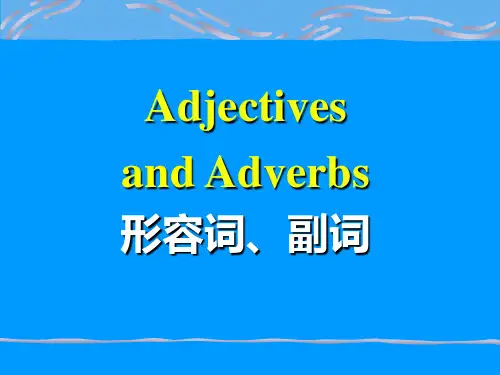
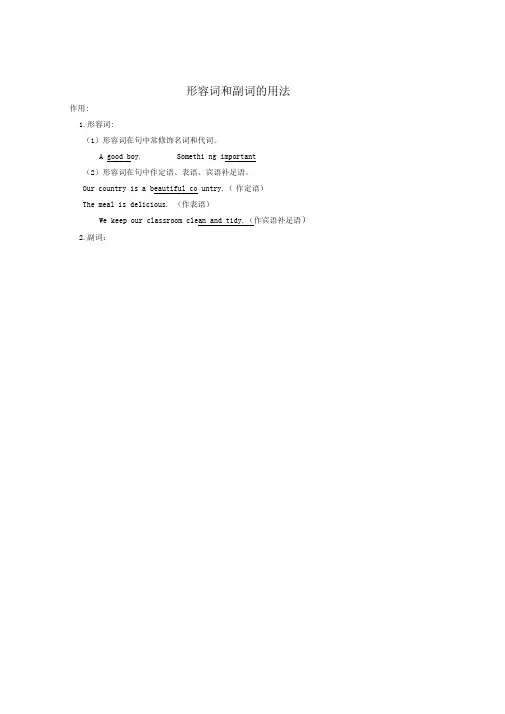
形容词和副词的用法作用:1.形容词:(1)形容词在句中常修饰名词和代词。
A good boy. Somethi ng important(2)形容词在句中作定语、表语、宾语补足语。
Our country is a beautiful co untry.(作定语)The meal is delicious. (作表语)We keep our classroom clean and tidy.(作宾语补足语)2.副词:(1)副词在句中修饰动词、副词、形容词、全句(Luckily)。
She speaks En glish w也(2)副词在句中可作状语、表语、和定语。
He studies very hard. (作状语)When will you be back. (作表语)Luckily, I passed the exam.常用来修饰原级的词有:very , too, so, really, quite, pretty、位置1.形容词:通常要放在所修饰的名词之前,但要放在不定代词(之后。
something、anything …)2.副词:1 )多数副词作状语时放在行为动词之后。
如果动词带宾语,则放在宾语之后。
Mr. Smith works very hard._ She speaks En glishweJl.2)频度副词作状语时,通常放在行为动词之前,情态动词、be动词和助动词之后。
He usually gets up early.3)程度副词一般放在所修饰的名词前面。
I am n ever late for school.He runs very fast.形容词和副词的比较级和最高级。
大多数形容词和副词有三个等级:原级、比较级、最高级。
原级指形容词和副词的原形;比较级用来表示较……”或更……一些”;最高级则表示最……”、形容词和副词的原级:1.表示两者(A与B)在某一方面相同时用句型:A +谓语+ as +形容词或副词的原形+ as+ B.。
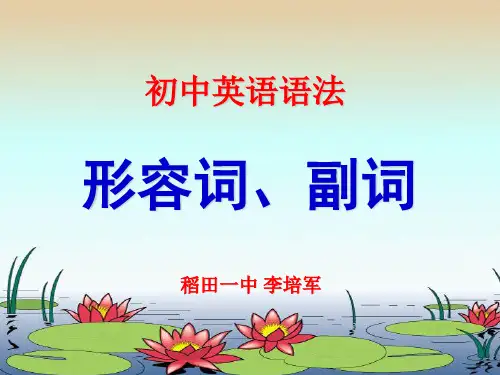
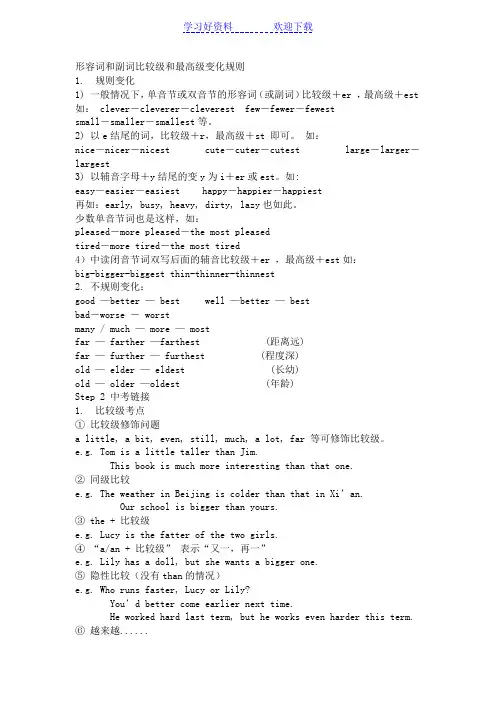
形容词和副词比较级和最高级变化规则1. 规则变化1) 一般情况下,单音节或双音节的形容词(或副词)比较级+er ,最高级+est 如: clever-cleverer-cleverest few-fewer-fewestsmall-smaller-smallest等。
2) 以e结尾的词,比较级+r,最高级+st 即可。
如:nice-nicer-nicest cute-cuter-cutest large-larger-largest3) 以辅音字母+y结尾的变y为i+er或est。
如:easy-easier-easiest happy-happier-happiest再如:early, busy, heavy, dirty, lazy也如此。
少数单音节词也是这样,如:pleased-more pleased-the most pleasedtired-more tired-the most tired4)中读闭音节词双写后面的辅音比较级+er ,最高级+est如:big-bigger-biggest thin-thinner-thinnest2. 不规则变化:good —better — best well —better — bestbad-worse - worstmany / much — more — mostfar — farther —farthest (距离远)far — further — furthest (程度深)old — elder — eldest (长幼)old — older —oldest (年龄)Step 2 中考链接1. 比较级考点①比较级修饰问题a little, a bit, even, still, much, a lot, far 等可修饰比较级。
e.g. Tom is a little taller than Jim.This book is much more interesting than that one.②同级比较e.g. The weather in Beijing is colder than that in Xi’an.Our school is bigger than yours.③ the + 比较级e.g. Lucy is the fatter of the two girls.④“a/an + 比较级” 表示“又一,再一”e.g. Lily has a doll, but she wants a bigger one.⑤隐性比较(没有than的情况)e.g. Who runs faster, Lucy or Lily?You’d better come earlier next time.He worked hard last term, but he works even harder this term.⑥越来越......a. 比较级 + and + 比较级b. the + 比较级 + 句子,the + 比较级 + 句子a. e.g. It’s getting colder and colder.The more you exercise, the better you are.2. 最高级考点说明:形容词的最高级前必须加the; 副词的最高级前省略the。
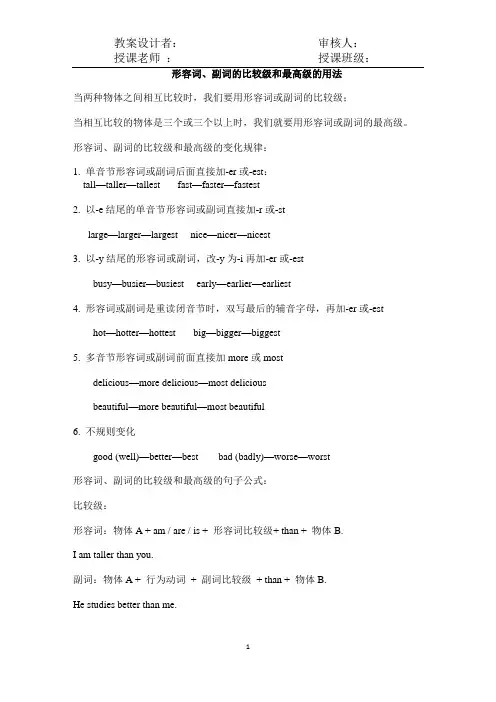
教案设计者:审核人:授课老师:授课班级:形容词、副词的比较级和最高级的用法当两种物体之间相互比较时,我们要用形容词或副词的比较级;当相互比较的物体是三个或三个以上时,我们就要用形容词或副词的最高级。
形容词、副词的比较级和最高级的变化规律:1. 单音节形容词或副词后面直接加-er或-est:tall—taller—tallest fast—faster—fastest2. 以-e结尾的单音节形容词或副词直接加-r或-stlarge—larger—largest nice—nicer—nicest3. 以-y结尾的形容词或副词,改-y为-i再加-er或-estbusy—busier—busiest early—earlier—earliest4. 形容词或副词是重读闭音节时,双写最后的辅音字母,再加-er或-esthot—hotter—hottest big—bigger—biggest5. 多音节形容词或副词前面直接加more或mostdelicious—more delicious—most deliciousbeautiful—more beautiful—most beautiful6. 不规则变化good (well)—better—best bad (badly)—worse—worst形容词、副词的比较级和最高级的句子公式:比较级:形容词:物体A + am / are / is + 形容词比较级+ than + 物体B.I am taller than you.副词:物体A + 行为动词+ 副词比较级+ than + 物体B.He studies better than me.1八年级下册教学案例设计最高级:1)物体A + am / are / is + the + 形容词最高级+ 比较范围(of + 人/物,in +地方).I am the tallest in the class.Pasta is the most delicious food of the three.2)物体A + 行为动词+ 副词最高级+ 比较范围(of + 人/物,in + 地方).Cheetahs run fastest in the world.He studies best of us.一. 词形变换。

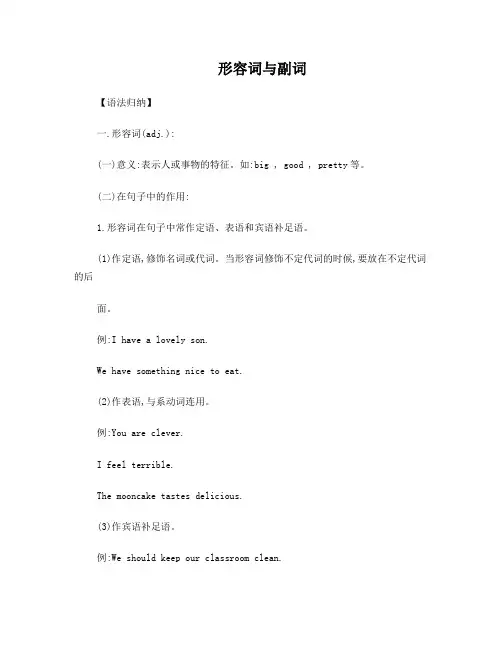
形容词与副词【语法归纳】一.形容词(adj.):(一)意义:表示人或事物的特征。
如:big , good , pretty等。
(二)在句子中的作用:1.形容词在句子中常作定语、表语和宾语补足语。
(1)作定语,修饰名词或代词。
当形容词修饰不定代词的时候,要放在不定代词的后面。
例:I have a lovely son.We have something nice to eat.(2)作表语,与系动词连用。
例:You are clever.I feel terrible.The mooncake tastes delicious.(3)作宾语补足语。
例:We should keep our classroom clean.2.特殊的形容词:(1)ill和well表示身体健康的时候,只能作表语,不作定语。
例:The boy was ill .不能说:He was an ill boy.The girl looks very well.不能说:She is a well girl.(2)以ly结尾的形容词,不要认为是副词。
如:friendly, lonely , lively二.副词(adv.)(一)意义:(修饰动词、形容词或其他副词)表示时间、地点、方法或程度等。
如:very , quite , slowly等。
(二)种类:1. 时间副词:now, then, ago , tomorrow2. 地点副词:here, there, outside, everywhere3. 方式副词:slowly, happily, angrily4.程度副词:almost, hardly, nearly5.疑问副词:how, why, where, when6.频度副词:always, often , usually(三)副词在句子中的位置:一般情况下,时间副词和地点副词的位置通常在句末,二者同时出现时,先地点后时间。
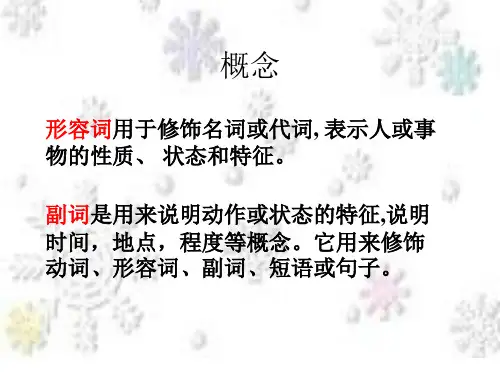

形容词和副词的最高级1.形容词、副词最高级的含义大多数形容词或副词的最高级用于三者或三者以上的人或事之间的比较 .表示最 高程度,即其中一个在某方面“最 在句中使用时,最高级前一般要加定冠词the, 副词的最高级前的the 可加可省.2.形容词、副词的最高级的构成⑴规则变化①单音节和部分双音节的形容词或副词一般在词尾加-est 构成最高级。
(clean- fast- high- )②以不发音的字母e 结尾的,直接加-st构成最高级。
(nice-)③以“辅音字母+y ”的,把“y ”变为“i ”,④以重读闭音节的单个辅音字母结尾的,双写该辅音字母,再加-est 构成最高级。
再加“ -est ” early- easy-构成最高级(happy-(big- hot- thin- )⑤多音节和部分双音节形容词或副词在原级前加most构成最高级。
(outgoing- quietly- difficult- )⑥由“动词+后缀-ing /-ed”构成的形容词,在词前加most构成最高级(bored-interesting- )⑦由“形容词+后缀-ly”构成的副词,在该副词前加most构成最高级。
(slowly- happily- )⑵不规则变化部分不规则形容词或副词的比较级:good /well_better - best bad / ill / badly -worse --worst many /much~more -mostlittle—less—leastold—older/elder—oldest/eldest far—farther / further -farthest / furthest3.形容词或副词最高级的用法⑴.o» in三者或三者以上的人或物进行比较时,用最高级,形容词的最高级前面要加the,后面用of/in, of+同类人/物,in+表地点的范围, 副词的最高级前面可用the,也可省略.eg: Tom is the tallest boy in his class. Tom is the tallest boy of all the boys.⑵.Which / who引导的选择疑问句有三者相比,也用最高级.eg: Which is the biggest ,the sun ,the earth or the moon?Who is the tallest, Tom, Mike orJohn?⑶.句式:one of+ the +形容词的最高级+名词复数,表示“…中最…之一”eg: Xi’an is one of the oldest cities in China?⑷.句式:the+序数词+形容词的最高级+名词,表示“第几…的”eg: The Yellow River is the second longest river in China.⑸.某人的+形容词最高级+名词当形容词的最高级前有形容词性物主代词、名词、所有格或指示代词时,不用定冠词.eg: This is my best book of all.检测练习:1.Maths is more popular than ____ .A. any other subjectB. all the subjectsC. any subjectD. other subject2.Tom is stronger than ___ in his class.A. any other boysB. any boysC. any boyD.the other boy3.Of the two cups, he bought .A. the smallerB. the smallestC. small D: smaller4.Who jumped ___ of all?A. farB. fartherC. farthestD. the most far5.Li Lei is___ student in our class.A. tallB. tallerC. tallestD. the tallest6.The fifth orange is ____ of all. Give itto that small child.A. bigB. biggerC. the biggerD. thebiggest7.Who is of you three?A.the oldestB. much olderC. oldestD. older8.Tom is one of ___ b oys in our class.A. tallestB. tallerC. the tallestD. the tall9.English is one of ____ spoken in the world.A. the important languagesB. the most important languagesC. most important languageD. the most important language10.B eijing is one of ___ in China.A. the largest cityB. the large citiesC. the larger citiesD. the largest cities11.Which is _____ i nteresting, science, maths or English?A. moreB. the mostC. veryD. too12.- I've had enough bread . Would you like ? -No , thanks .A. a few moreB. one moreC.another more D. some more二、用所给形容词和副词的适当形式填空。
形容词、副词的比较级和最高级的用法:当两种物体之间相互比较时,我们要用形容词或副词的比较级;当相互比较的物体是三个或三个以上时,我们就要用形容词或副词的最高级。
形容词、副词的比较级和最高级的变化规律:1.单音节形容词或副词后面直接加-er或-esttall—taller—tallestfast—faster—fastest2.以-e结尾的单音节形容词或副词直接加-r或-stlarge—larger—largestnice—nicer—nicest3.以-y结尾的形容词或副词,改-y为-i再加-er或-estbusy—busier—busiestearly—earlier—earliest4.形容词或副词是重读闭音节时,双写最后的辅音字母,再加-er或-esthot—hotter—hottestbig—bigger—biggest5.多音节形容词或副词前面直接加more或mostdelicious—more delicious—most deliciousbeautiful—more beautiful—most beautiful6.不规则变化good (well)—better—bestbad (badly)—worse—worst形容词、副词的比较级和最高级的句子公式:比较级形容词物体A + am / are / is +形比+ than +物体B.I am taller than you.Pasta is more delicious than pizza.副词物体A +行为动词+副比+ than +物体B.Cheetahs run faster than goats.He studies better than me.最高级1)物体A + am / are / is + the +形最高级+比较范围(of +人/物,in +地方).I am the tallest in the class.Pasta is the most delicious food of the three.2)物体A +行为动词+副词最高级+比较范围(of +人/物,in +地方).Cheetahs run fastest in the world.He studies best of us.一.词形变换。
2019年高考英语语法必考考点(5):形容词和副词含解析李仕才【考点解读】一、基本用法形容词的基本用法如下表:句法功能例句作定语The research lacks solid evidence, and therefore, its conclusions are doubtful. (2012·浙江高考)作表语Trains are fast and convenient, but rush hours can be terrible.作宾语补足语Life is hard there, and the mountains make communications difficult.作主语补足语The upper closet was found empty.作主语或宾语(与the或所有格连用) On buses, the young offer their seats to the old, the sick and the disabled.作伴随状语The survivors lay on the beach, exhausted and shocked.副词的基本用法如下表:句法功能例句作状修饰动词We used to see each other regularly, but I haven’t heard fromhim since last year. (2012·辽宁高考)二、形容词和副词的比较等级形容词和副词的比较等级分为原级、比较级和最高级。
1.比较级和最高级的构成(1)规则形式①单音节以及少数以ow(如narrow)结尾的双音节形容词或副词,在原级后加er, est构成。
如:clever -cleverer -cleverest。
其他特殊变化见下表:active -more active -most activehappily -more happily -most happily(2)不规则形式good/well -better -bestfar -farther/further -farthest/furthestbad /ill /badly -worse -worstold -older/elder -oldest/eldestmany/much -more -mostlittle -less -least2.基本用法(1)两者相比(甲=乙),用“as+原级+as”表示。
4. 形容词和副词4.1 形容词及其用法形容词修饰名词,说明事物或人的性质或特征。
通常,可将形容词分成性质形容词和叙述形容词两类,其位置不一定都放在名词前面。
1) 直接说明事物的性质或特征的形容词是性质形容词,它有级的变化,可以用程度副词修饰,在句中可作定语、表语和补语。
例如:hot 热的。
2) 叙述形容词只能作表语,所以又称为表语形容词。
这类形容词没有级的变化,也不可用程度副词修饰。
大多数以a开头的形容词都属于这一类。
例如:afraid 害怕的。
(错)He is an ill man.(对)The man is ill.(错)She is an afraid girl.(对)The girl is afraid.这类词还有:well,unwell,ill,faint,afraid,alike,alive,alone,asleep,awake 等。
3)形容词作定语修饰名词时,要放在名词的前边。
但是如果形容词修饰以-thing为字尾的词语时,要放在这些词之后,例如:something nice4.2 以-ly结尾的形容词1)大部分形容词加-ly可构成副词。
但friendly,deadly,lovely,lonely,likely,lively,ugly,brotherly,仍为形容词。
改错:(错)She sang lovely.(错)He spoke to me very friendly.(对)Her singing was lovely.(对)He spoke to me in a very friendly way.2)有些以-ly 结尾既为形容词,也为副词。
daily,weekly,monthly,yearly,earlyThe Times is a daily paper.The Times is published daily.4.3 用形容词表示类别和整体1)某些形容词加上定冠词可以泛指一类人,与谓语动词的复数连接。
英语语法之形容词、副词一、定义:形容词是用来修饰和形容名词,说明人与事物性质和特征的词。
副词是用来修饰动词、形容词、副词或整个句子。
二、比较级和最高级的构成方法:1.单音节词和少数双音节词比较级和最高级的规则变化:2. 其他双音节词或多音节词,在该词前面加-more/mostbeautiful—more beautiful—(the) most beautiful3. 由形容词加ly构成的双音节词和多音节词,都是在该词前加-more/most.quickly—more quickly—(the) most quicklydifficultly—more difficultly—(the) most difficultly4. 不规则变化:不规则变化记忆口诀:特殊形式比较级,共有三对二合一。
病坏两多并两好,little意少不是小。
一分为二也三个,距离老远常迟到。
三、形容词比较级和最高级的用法:1. 原级的用法:用于两者之间对比,意思为“……和……相同”A+v.+as….+形容词原级+as BTom is as honest as Jack.2.比较级的用法:①A+形容词比较级+than+ BBeijing is more beautiful than Tianjin.形容词比较级前还可以用much, even, still, a little,far, a lot, a bit, much more来修饰,very, so, too, quite 不能修饰比较级。
②数字+形容词比较级+thanI’m two years older than you.She is a head taller than me.③比较级+and+比较级,表示“越来越……”The earth is getting warmer and warmer.China becomes more and more stronger.④the +比较级,the +比较级结构,表示“越……就越……”The more I study it, the more I like it.⑤which/who +is +比较级Which city is bigger, Beijing or Tianjin?Who is happier, you or me?3. 最高级用法:用于三者及以上的人或事物的比较,最高级前加the,后面跟带in或of表范围的短语。